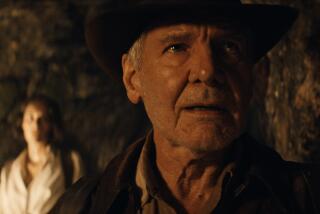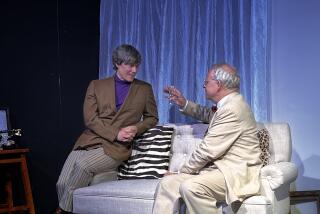Anonymous Elmer Wrote the Book on Page Turning
- Share via
WASHINGTON — Elmer Booze strides onto the concert stage for another virtuoso performance, but nobody applauds. He shares the spotlight but never takes a bow. His name doesn’t even appear in the program.
So what? The guy spends most of the evening staring at the sheet music and wetting his thumb and forefinger. Big deal.
Any pianist, though, will say that Elmer Booze really is a big deal. He is a professional page turner, one of the most indispensable--and most anonymous--figures in the musical world.
Booze, 57, a small, soft-spoken man who wears gold-rimmed glasses, has turned the pages of musical scores for Aaron Copland, Rudolf Serkin, Andre Watts, Leon Fleisher and Bella Davidovich and hundreds of other musicians for nearly a quarter-century.
He turned pages for opera singer Leontyne Price’s accompanist at a White House recital for President Jimmy Carter. He has been a consultant and resident page turner for the annual summer Newport, R.I., Music Festival for the last 14 years.
He is a regular at concert series at the National Gallery of Art, the Canadian Embassy, the Kennedy Center and the Library of Congress in Washington. He has flown to New York and London to sit at the elbow of concert pianists who insisted that only Elmer Booze would do.
An accomplished pianist himself, with music degrees from two universities, Booze is content to labor in the shadows of the keyboard giants.
A colleague at the Library of Congress, where Booze works during the day as a senior reference librarian in the music division, proudly calls him “a world-renowned page turner.” Booze modestly dismisses such extravagant praise.
“For me, it’s a job that anybody can do,” he said. “But apparently that’s not entirely true. I’ve talked to pianists who say they can’t turn pages. It makes them very nervous.”
By contrast, Booze sits on the edge of his chair with unflappable ease as the pianist struggles through stormy fortissimos and crashing arpeggios.
“Pianists want someone with them in their greatest moment of need, when they’ve gotten to the last note on the page,” he said.
That’s the moment when Booze shifts into a low crouch and, with a lightning thrust of the arm, flips to the next page and returns to his seat. His movements are so unobtrusive that one pianist calls him “the ghost.”
A good page turner must be skilled in reading a musical score, Booze says, and a rehearsal is helpful to become familiar with the pianist’s eccentricities.
Does he memorize the score? (Chamber music is rarely played from memory, Booze says.) Are the pianist’s jerks and nods a signal to turn the page, or is he simply getting carried away with the music? Are the pages old and brittle? Do they stick together?
Onstage, he says, a page turner should keep his eyes on the music and maintain “a certain decorum” to put the pianist at ease.
“If there’s panic in your eyes, you can believe the pianist will panic too,” he said. “The last thing he needs is a spastic page turner.”
Despite the page turner’s best efforts, disasters do happen. Booze recalls the nightmarish evening of the missing paper clip.
His pianist had promised in the dressing room of the Kennedy Center Concert Hall to insert a paper clip in the score of a devilishly complex work for two pianos by Franz Liszt. At the point when Booze was supposed to turn back 20 pages for a repeat in the second movement, the paper clip wasn’t there.
“It was something to behold,” he said. “He was going like a bat out of hell. His arms were in my way and mine were in his, trying to find the exact page. Both pianists stopped playing, and the whole thing came to a screeching halt. It was not a good show.”
Booze has left his tuxedo jacket unbuttoned during concerts ever since he rose from his chair to turn a page for Aaron Copland and a button popped onto the keyboard while the composer was performing at the Library of Congress.
Booze turned another anxious moment into a tour de force that garnered the first and only ovation he has ever received from an audience.
When he and a pianist took their seats at the Newport festival, they discovered that the piano’s music rack had been removed and was nowhere to be found. So Booze became a human music rack, holding up photocopies of each page of the score.
When the piece was finished, the festival president leaped to her feet. “Let’s all clap for Elmer,” she shouted, and the page turner shyly emerged from the shadows to accept his acclaim.
More to Read
The biggest entertainment stories
Get our big stories about Hollywood, film, television, music, arts, culture and more right in your inbox as soon as they publish.
You may occasionally receive promotional content from the Los Angeles Times.










